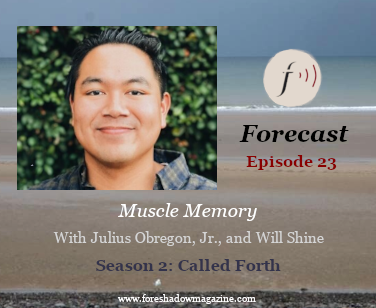|
After clicking 'Play', please wait a few moments for the podcast to load. You can also listen on Spotify, Apple, Google, Podomatic, Player FM and Deezer. Listen to other Forecasts here. Musician and vocational mentor Julius Obregon, Jr., speaks with Will about parallels between musicianship and the spiritual journey. For Julius, vocation involves all of our lives and is driven by love. Just because one is called doesn't mean automatic arrival at one's destination; excellence requires discipline and learning from others. Our longings shape us, Julius says, and we are called to conform our longings to their divine source. This episode includes a clip of Julius' music. Below are excerpts from today's Forecast. They have been lightly edited for clarity and concision. What we do in our daily life I had to really do a lot of work to connect a lot of that heady stuff to things like my heart and my body and what I do with my every day. What we love about the monastics is that they understand the integration between all of those parts. The focus on daily habits is an important part of embodying our vocation because we understand vocation to be more than being defined by those few and far between, grandiose moments when we might display character, or those heroic moments. Our character and vocation are best displayed and embodied in what we do in our every day life. The things that are habitual to us. The every day, small decisions that we make. My love of the thing itself The pursuit of vocation is that back and forth between the 'whoa' transcendence and the working it out in the immanent. And I love how you're connecting it to my guitar playing because I think my participation in music as a craft has resourced me a lot in understanding what discipleship is. I discovered such a deep love and curiosity for this thing. That's what fuelled my discipline...I do attribute a lot of my growth to my love of the thing itself. I need to learn under someone else I started by myself, and then I reached a certain point where I was like, there's so many things that I don't know, that I don't think I can take myself to, so I sought out a teacher. This is exactly an analogue of what my spiritual life is like, of following this longing and then getting to a point of where I can only go so far by myself. I need to learn under someone else who is maybe more initiated in this way, or who can help me know what kinds of questions I need to ask...It was a back and forth of me being given something and then me working it out to my limits until I was like, 'Help me.' But I think it was being around somebody who've had more time and communion with this thing called music, or this craft...Being with my teachers was important because it was an embodied way for me to observe and take in what it looks like to be further along in knowing and participating in this thing. Muscle memory In college, I was finding more and more of a disconnect: I don't think I can tap into, if high school was me running off the juices of the big transcendent experiences, those big emotional things aren't happening to me anymore. But liturgy is this thing that grounds you. I can always practise my scales. Sometimes it'll click and it'll help me, and sometimes it'll feel rote, but it keeps me tethered to this thing, and it's growing muscle memory in me. That's what liturgy and spiritual practices do...In monasteries, they gather together for morning prayer every day. And then that catapults them into the rest of their day, and they do their stuff, and they come back together for midday prayer. And that's not always feasible given our different schedules, but at the very least, [they're] coming together. There are many moments when I would show up to morning prayer, and I would feel like I wasn't getting anything from the scriptures, but to have words that I was able to pray, and to be able to lean upon that when I didn't have any language to offer up myself was kind of like scales. I don't have anything, I don't have anything to write, but I know that playing these things is...forming something good in me. Conforming but not erasing desire We are first and foremost loving creatures. Our daily habits and, broader than that, the cultural liturgies we participate in, are shaping what we desire. Desire does so much to move us. It's a primary driving factor to why we do what we do...It does take discernment [to figure out] where my deep longing meets the world's deep need...I think there's something of God in my desire to play music and write and tell stories. Whatever eternity looks like, it's communion with God here and after...I think it's like tuning a poorly tuned guitar. There's something beautiful in what music connects me to, but that longing can also take me to places where I'm inflicting violence on people because primarily what's driving me is a desire for myself. So I think there is some refining that happens. My desire for drawing out beauty and telling stories and playing music -- there is something good and true and beautiful in that, and there are ways that that can be expressed and malformed. In some ways, there is a conformity that happens, but it doesn't erase my particularity.
0 Comments
Leave a Reply. |
Categories
All
ForecastSupport UsArchives
July 2024
|

 RSS Feed
RSS Feed
